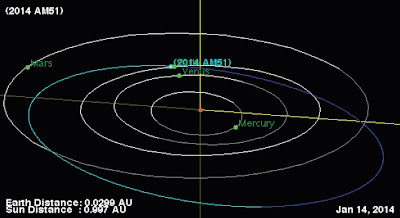Asteroid 2014 AM51 passed the Earth at a distance of 3 041 000 km (7.91 times the average distance between the Earth and the Moon) slightly after 9.45 pm GMT on Tuesday 7 January 2013. There was no danger of the asteroid hitting us, and had it done so it would not have presented a major risk. 2014 AM51 is estimated to be between 20 and 62 m in diameter, and an object of this size would be expected to break up in the atmosphere between 23 and 5 km above the Earth's surface, with only fragmentary material reaching the ground.
The calculated orbit of 2014 AM51. JPL Small Body Database Browser.
2014 AM 51 was discovered on 11 January 2014 (four days after its closest approach to the Earth) by the University of Arizona's Catalina Sky Survey in the Catalina Mountains north of Tucson. The designation 2014 AF16 implies that it was the 1287th asteroid discovered in the first half of January 2014 (period 2014 A).
2014 AM51 has an 749 day orbital period and an eccentric orbit tilted to the plane of the Solar System that takes it from 0.99 AU from the Sun (i.e. 99% of the average distance at which the Earth orbits the Sun) to 2.24 AU from the Sun (i.e. 224% of the average distance at which the Earth orbits the Sun, considerably outside orbit of the planet Mars). It is therefore classed as an Apollo Group Asteroid (an asteroid that is on average further from the Sun than the Earth, but which does get closer).
See also Asteroid 2014 AY32 passes the Earth before being discovered, Asteroid 2013 UB1 passes the Earth, Asteroid 2014 AF16 passes the Earth, Asteroid 2014 AA passes the Earth at a distance of about 570 km and Asteroid 2013 YB14 passes the Earth before being discovered.
Follow Sciency Thoughts on Facebook.

